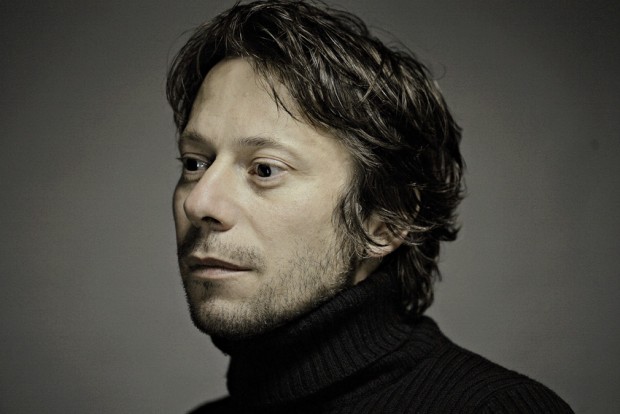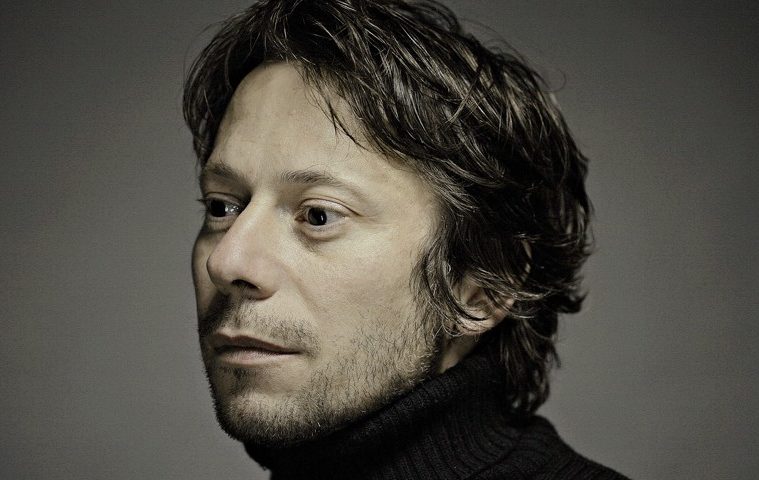
Running through mid-December, the French Institute Alliance Francaise and Anthology Film Archives have launched a retrospective of Mathieu Amalric‘s work, which they’ve appropriately titled “Renaissance Man.” The retrospective will feature Amalric’s work as a director, screenwriter and actor; and in the selections that range from the Oscar-nominated Julian Schnabel’s The Diving Bell and the Butterfly to the Larrieu Brothers’ A Man, A Real One, audience members can trace Amalric’s evolution into one of the most eclectic artists of his generation.
In person, Amalric is as full of energy and charisma as some of his characters, particularly those he’s played in the films of frequent collaborator Arnaud Desplechin. He uses his whole body to speak, often widening his eyes, hunching his shoulders, and using his hands to make specific points. He’s unafraid to speak his mind, is generous with his words, and instantly makes one feel as if they’ve known each other for years. As we sit down to talk about the retrospective he also warns me, “I’m a parrot,” offering another kind smile.
The Film Stage: Does having an entire retrospective of your work make you introspective at all? Do you look back at your work so far?
Mathieu Amalric: No. Fortunately the spirit of this is more like friendship. Anthology Film Archives had this idea and I’m very touched and very moved that the French Institute became involved. I just lived a similar “old man thing” at the Cinematheque Francaise because they had a two-month-long retrospective of my work as well.
Two months is impressive!
They played 60 or 70 films and I went there maybe 17 times and invited technicians, friends, sound engineers, sound editors, writers with whom I’ve worked. Every day it was quite alive. I stayed and watched those old things, and you don’t say, “Now I can die. It’s fine.” It makes you want to do other things. The films seemed strange, but that was OK — they seemed to have a necessity to why they were done. Here in New York, since I also act in films from other people, maybe it’s a good way for people to discover filmmakers who aren’t well known here.
Going through your filmography, I committed the sin of trying to find threads in your work…
Of course! There must be!
I found some, too.
Please, tell me.
When I was watching My Golden Days at the New York Film Festival, there is a scene where your character is accused of being a spy and having a double. Looking at something as random as Quantum of Solace, where you play the villain, to something like The Blue Room, where you play a cheating husband, to The Diving Bell and the Butterfly, where your character goes through two very different phases, it seems you’re attracted to the idea of making films about doubles — which, in a way, is essentially the art of acting.
It’s true. It’s not something I’m aware of when I do the films… what I know is that I’m attracted to acting because the characters’ worlds seems bigger than mine, and they allow me to discover other ways to see life, to read human relationships and politics. Because I’m truly in the world of the Larrieu brothers or Desplechin, certainly I do it because it’s a way for me not to stay in one boring place. I have the luck to see the world through other eyes, which must be one of the reasons why each time I can’t resist a great director’s offer.
Maybe it has to do with doubles, not being yourself, and then those experiences have an influence on the films I direct. You are completely nourished by those other worlds. In something like Love is the Perfect Crime, I play a guy who’s a literature professor, who teaches two beautiful young girls, who he often sleeps with, and in the morning they are dead in his bed — so he gets rid of the bodies — but you never know if he did it or not.
But now that you mention that film specifically, in other films, like Venus in Fur and Jimmy P., you also play instructors, directors — you teach people how to act.
[Laughs and nods]
You’ve said many times that Desplechin invented you as an actor, so I was wondering if part of your mission as a director is to help “invent” other actors?
Of course I don’t put on my shoulders such a heavy and beautiful mission. I think that people in social life are more impressive in what they do: helping people and struggling, fighting, resisting… people outside the artistic world are doing things that are much more incredible than what we do. There is maybe the hope that something can be shared when you do a film, to transform a material that is maybe very intimate, and just try to believe that it can be shared.
It’s true that — especially during our adolescence, as we try to find ourselves — we are a little bit like monsters. We think we have bad thoughts, and that we are alone with those thoughts. We become ashamed, and all the books we read, the films we saw, the music we listened to, they all make us feel not alone, they help you to live and try not to fuck up. Art is precious to us because of that — we all have our own patchwork of those things. There is something that’s very important to me from American cinema and it’s to combine entertainment and intimacy — not to take people for idiots, but also not to do films that are just selfish.
The first time I remember seeing you in a film was in Munich, and I couldn’t believe how much you looked like Roman Polanski…
A lot of people say that. I hear it often.
I was quite pleased, and not surprised, when he cast you in Venus in Fur. Did you two ever talk about this?
People talked to him about that. Then in that film, he will say no, but I find it strange that he gave my character that awful hair that he had in the ’70s. He’s also an actor, so he shows you how to do things, and Venus in Fur is like a visit to all of his films. You have the green velvet vest from The Fearless Vampire Killers, and then the ending is the same from The Tenant… you see there are lots of similarities.
Polanski’s own patchwork.
My grandmother was born in Poland, she was a Polish Jewish woman, so it might come from there. We didn’t really care about it, though, but sometimes we made jokes. When we went looking for costumes in shops he would say to the salespeople, “I’m searching for a jacket for my son,” which I thought was very moving. It was nice of him.
In The Diving Bell and the Butterfly you do so much work with your face and your eyes that I wonder if you have an affinity for great actors of the silent era? Did you study them for the part?
I have no acting background studies — I try just to feel what the director is searching for. I search for complicity. The thing with Julian Schnabel was, we were trying not to make that man a saint, because American cinema, in its sickness — in French cinema we also have our own sickness and clichés — but in American storytelling there’s thing thing where an asshole goes through hard moments and then he discovers that in fact he’s a beautiful person. That’s 97 percent of American cinema, so that people can identify themselves with the character, think they’re not assholes, and then go back to work and continue being racist or bad to others.
The thing for us was to turn this man into a normal guy who likes to see the nurse’s breasts, say stupid jokes. Sometimes he’s brilliant… just like a regular human being. His face doesn’t move, so we recorded his thoughts as we shot the film, not months later. When the other actors had to play with the camera, they didn’t need me, so I would go to another room, see what they were doing. I had a mic, so I’d say things that went through my mind that the actors wouldn’t listen to. Only Julien and the DP heard them, which created a sort of fantasy environment.
A disembodied spirit. Another double.
Mathieu Amalric: Renaissance Man runs through December 15 at FIAF’s CinéSalon. See more details here and here.

